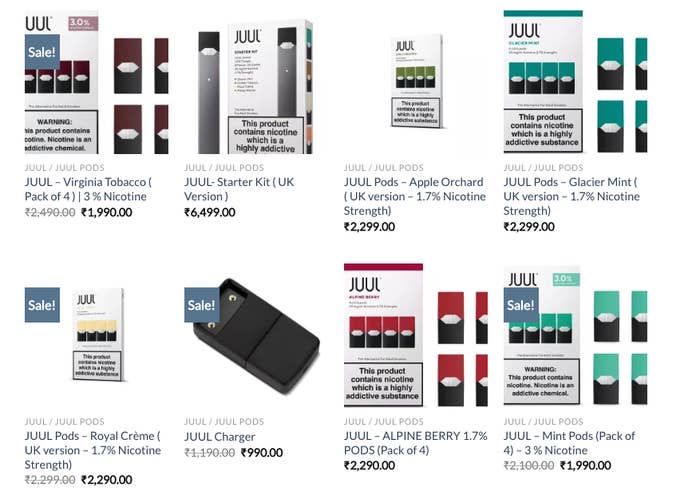
Juul is experiencing an unintentional bump in popularity in India, thanks to online and brick-and-mortar vendors who are reselling it on the unofficial gray market. Indian vendors told BuzzFeed News that the trendy e-cigarettes are flying off their shelves, at high prices, amid a lack of regulatory clarity around e-cigarettes in general in the country. While there is no federal ban on vape sales, the devices can’t be sold in a growing number of states in India and the health ministry has asked the commerce secretary to ban the entry Juul products into the country.
Juul, which is exploring a launch in India — the world's second-largest market of smokers — does not officially sell its products in India and described some of the current unauthorized trade there as “illegal” in a statement to BuzzFeed News.
The vendors said they buy Juul e-cigarettes and nicotine pods at retail cost, plus shipping, from contacts in the US, and go on to resell the products at a premium in India, where a Juul starter kit goes for about $100 (compared to $29 in the US), far more than other alternatives like Justfog. Juul devices go for about $50 (they’re $20 in the US) and a four-pack of pods that’s $16 in the US sells for twice as much.
Despite the high cost, Juul is lighting up among India’s well-heeled, urban consumers. “I don’t see anybody vaping anything else anymore,” said Sahil Behal, a fashion photographer from Mumbai.
Three sellers, who wished to stay anonymous, told BuzzFeed News that they sell between 300 and 400 Juul devices, and around 1,000 Juul pods each month. “It’s literally the only thing people ask for,” said a vendor from Mumbai. He estimates Juul now accounts for 70% of his vaping business.
“I’m selling out so fast I’m having trouble keeping up with my orders,” Pierre Andre, who sells Juul online, told BuzzFeed News. “Not many people vaped in India till a couple of years ago, but now, everyone just wants Juul.”
There’s a healthy appetite for swanky, tech-adjacent imports — the Mumbai vendor said wealthy customers started getting Juul devices from the US about a year ago. But sellers also said India's sudden appetite for Juul seems to be fueled, at least in part, by the controversy surrounding the product in the US, where critics have slammed it for creating “epidemic levels” of nicotine use among teens with its flavored pods. “I’m thrilled that this company ran into a lot of controversy there,” said the vendor in Mumbai. “It made people here take notice. Any publicity is good publicity.”
In a statement to BuzzFeed News, a Juul spokesperson said, “JUUL Labs is committed to compliance with and respect for all local laws. … We do not endorse the availability of JUUL products in India as they are being brought in under parallel import or illegally.” Juul said it does not ship to India, and in general, “We do not ship outside the country where the purchase was made. We monitor and take action where we can against those we believe are shipping our product overseas."
Both unofficial Juul vendors and Juul itself are navigating evolving regulations for tobacco and electronic cigarettes in India. “We are open to dialogue with lawmakers and regulators,” said Juul’s spokesperson.
Twelve of India’s 29 states have banned e-cigarettes; and the Directorate General of Health Services (DGHS), India’s health regulator, issued an advisory last year urging the others to stop importing and selling vaping devices for the “great health risk” that nicotine poses, including dependence, harm to pregnant women, and cardiovascular disease.
A study published in February in the New England Journal of Medicine said that while e-cigarettes were better at helping people cut back on traditional cigarettes compared to therapies like nicotine patches, users grew dependent on them over time. Of the study’s nearly 900 participants, 80% who switched to e-cigarettes from traditional cigarettes continued to use them at the end of a year, while only 9% of the people who substituted traditional cigarettes with alternatives started smoking again.
Their rising popularity is raising concerns from health experts in India. “Launching Juul in India is a bad idea,” Dr. Vivek Nangia, director of pulmonology at New Delhi’s Fortis Healthcare, told BuzzFeed News. “It’s pitched as a product that lets people cut down on cigarette smoking, but there’s a strong chance people who use them get dependent on them because of their high nicotine content.”

Juul products are available in large Indian cities at many stores that sell electronic cigarettes and vaping products, and are prominently featured on dozens of websites that sell vapes in India.
As was the case in the US, social media helped Juul spread in India. A search on Instagram, for instance, brought up the accounts of dozens of Indian vape sellers with posts of Juul pods and devices and links to their own websites. Ordering a Juul is as simple as adding it to your cart and checking a box that certifies you’re 18 — the minimum age to buy e-cigarettes in India. Some sellers list a WhatsApp phone number in their Instagram bios and take orders there, with payments completed through PayTM, a popular Indian mobile payment service similar to Venmo, or “cash on delivery.”
The devices are shipped across the country — including to the states that have banned electronic cigarettes. “Nobody’s really checking,” said an online seller who asked to remain anonymous.
@Omvapors Sure would love to try out what you got and create a YouTube video around it! The vaping community in India is only getting stronger by the day!
Physical stores in states that have banned these products are in full violation of the law, said Samrat Chowdhery, the director of the Association of Vapers India, a nonprofit that advocates for tobacco alternatives in India. “But the onus on preventing these devices from entering the state is on state authorities, and I don’t see many of them proactively preventing these goods from coming in.”
As regulations and enforcement remain unclear, e-cigarette vendors continue to operate in this gray market.
Documents reviewed by BuzzFeed News, for instance, show that last month, the DGHS issued an advisory urging India’s states to stop sellers from importing, selling, or trading electronic cigarettes. A small group of independent sellers challenged it in the Delhi High Court. “Right now there is only an ‘advisory,’ not legislation,” said Chowdhery.
Still, that doesn’t mean the gray market doesn’t come with risks in India. In December, local authorities arrested a seller in the city of Hyderabad — which has not yet banned e-cigarettes — saying he violated India’s Cigarettes and Other Tobacco Products Act (COTPA), which prohibits advertising cigarettes and tobacco products openly, and selling them to minors, among other things. Chowdhery also called this “a bullshit argument,” as electronic cigarettes haven’t been included in COTPA yet.
There is still no national law prohibiting the advertisement of e-cigarettes in India, said Chitranshul Sinha, an Indian Supreme Court lawyer. But at the end of 2018, India’s government proposed rules that would, among other things, require platforms like Facebook, Instagram, Twitter, and WhatsApp to remove all content that promotes vaping in the country. (In November, Juul shut down its official Facebook and Instagram accounts — pages with thousands of followers each — amid criticism in the US that it was using the platforms to market its device to underage users.) Juul told BuzzFeed News, “We do not have definitive plans to launch in India.”
Still, the company is already pushing back against these proposed rules. In January the company wrote a letter to India’s government saying it was “concerned” the proposed regulations would prevent adult smokers from accessing information about vaping products and buying them online. It also positioned itself as an “alternative for adult smokers looking to make a switch from combustible cigarette smoking” and wrote that “being free from tobacco, Juul vaping products have the potential to be a reduced harm alternative for adult smokers.”
Juul had 73% of the US electronic cigarette market in 2018, according to data from Nielsen, and it recently received a $12.8 billion investment on a $38 billion valuation from cigarette giant Altria. In 2017, India’s nascent vapor-products market was worth $15.6 million, with no single brand holding a large chunk of the market, according to market research agency Euromonitor International, but it was expected to grow by nearly 60% a year till 2022.
While its eventual launch in India could bring down pricing and create a new market for smokers, it won’t be simple, Chowdhery said. “They’re also going to get the entire baggage of controversies with them when they come.”
